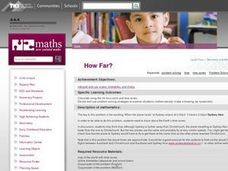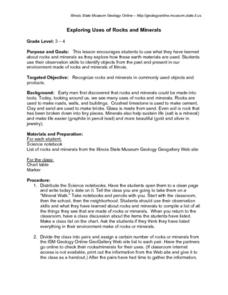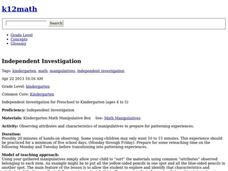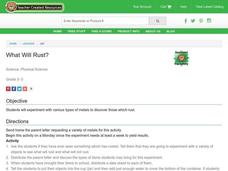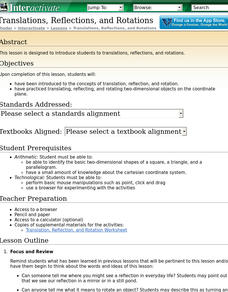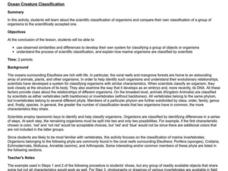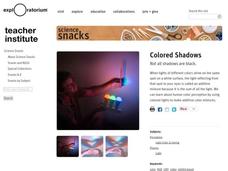Curated OER
Sliding and Stuttering
Ninth graders use a spring scale to drag an object such as a ceramic coffee cup along a table top or the floor. The spring scale allows them to measure the frictional force that exists between the moving cup and the surface it slides on....
Curated OER
Introduce Solids
Middle schoolers identify and interpret a variety of solid materials - cloth, wood, metal, plastic, paper, and rubber. After a period of free exploration, they then describe the properties of the objects and develop vocabulary in order...
Curated OER
The Ruler, The King of Measurement
First graders learn how use a ruler to measure common items. In this measurement lesson, 1st graders examine the numerical markings on rulers and learn that each number stands for a unit of measure. They measure 5 classroom items after...
Curated OER
Healthy Eyes and Low Vision Care
Students explain how eyes function, how to prevent eye problems, the types of refractive errors, and the common low vision and eye disease problems. They receive professional development points upon successful completion of an assessment.
Curated OER
How Far?
Students explore how different textures provide varying amounts of friction to objects moving across them. They build a tool to measure the amount of friction between a note card and various surfaces by measuring the distance that a...
Curated OER
Exploring Uses of Rocks and Minerals
Students explore the uses of rocks and minerals. They make observations to identify objects from the present and past are made out of rocks.
Curated OER
Can You Get A Charge Out Of Matter?
Students observe and demonstrate how objects can be charged positively and negatively and how static electricity works. They observe a teacher-led demonstration, and in small groups rotate through various static electricity activities,...
Curated OER
Introduction to Estimation and Making Arrays
Students explore the concept of estimating and organizing a group of objects into an array to count the exact number of items. They create their own arrays and practice elements of estimation.
TLS Books
Easter Count and Color
Mostly a holiday coloring sheet, kindergarteners also count and write the number of jellybeans depicted. Though there is only one set of objects to count, the activity does, indeed meet the stated Common Core standards. Ask individuals...
Curated OER
Seeing Is Believing: Atoms
In this scientific investigation learning exercise, students follow the provided procedures to examine 4 mystery objects and then respond to 2 short answer questions.
Curated OER
Compass Designs
Students investigate the properties of two and three dimensional objects. In this geometry lesson, students differentiate polygons based on similarity and congruence. They make observation and interpret the data.
Curated OER
Independent Investigation
Students classify objects. In this math lesson, students sort and classify objects based on their characteristics. Students identify characteristics of objects.
Curated OER
What Will Rust?
Learners discuss if they have ever seen anything that has rusted. They place metal objects into the cup and then add just enough water to cover the bottom of the container. They complete information on their data sheets and record as...
Curated OER
Vocabulary Lesson-Pre-K Through Grade 2 and ESL
Students say the name of pictures of simple objects, people and places, choosing 15 to use for the lesson. Students glue pictures in a scrapbook and write the word for each picture beside it. Students complete word recognition worksheets...
Curated OER
4 Part Color Study in Painter Classic
Learners use the Wacom tablet to demonstrate observational drawings, design principles, and color schemes. Students create four different images of a common art or graphics tool based on four color schemes and a different effect.
Curated OER
Factor Cards
Students are introduced to the concept of factorization. Individually, they are given seven cards and turn over one card at a time. They take the card and place it on top of the pile and identify the common factor with the one they are...
Curated OER
Translations, Reflections, and Rotations
Tenth graders have been introduced to the concepts of translation, reflection, and rotation, and have practiced translating, reflecting, and rotating two-dimensional objects on the coordinate plane.
Curated OER
La Mochila (The Backpack)
Middle schoolers examine objects, labeled in Spanish, that are common items found in a backpack. They write simple sentences in Spanish listing the items from the backpack.
Curated OER
Ocean Creature Classification
Students develop their own system for classifying a group of objects or organisms using observed similarities and differences. They investigate the process of scientific classification, and explain how marine organisms are classified by...
Curated OER
Celebration Symbols And Their Meaning
Students are introduced to the history and origins of many common symbols used in celebrations. They explore symbols in group centers, identify a symbol that has special meaning to them and design a symbol to represent the classroom.
Curated OER
Historical Maryland Women
Learners identify objects, activities, and people in pictures of women in Maryland's history. In groups of four, they analyze photo packets of historical women. Students complete an acrostic using phrases reflecting specific...
Curated OER
It's a 3-D World Out There!
Learners construct polygons. They identify attributes of three-dimensional shapes. Students name common three-dimensional shapes. They draw three-dimensional shapes, and sort three-dimensional shapes. Learners use K'NEX materials sets to...
Curated OER
Colored Shadows
Students examine how humans perceive color. In this refracted light lesson, students explore the different ways color is seen by the human eye. Students will use colored lights and colored paper and solid objects to make additive color...
Curated OER
Measuring Sizes
Students explore the concept of scale. In this measurement lesson, students measure common classroom objects in order to help them better understand scale.




